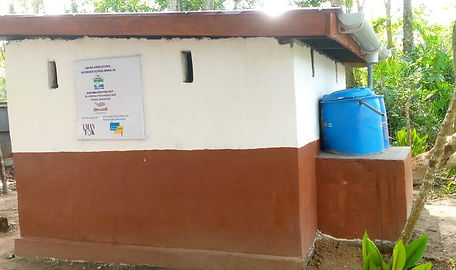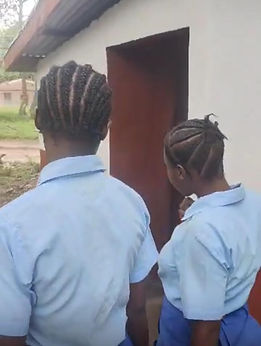

project start date: October 2023
completion: May 2024
Following our pilot project at Malimba, we raised further funding to continue roll out of She-Shelters in Sierra Leone. Our fourth She Shelters project is at Barina Agricultural Secondary School. The headmaster says "80% of girls at this school stay home during menstruation worried about blood stains on their uniforms and being teased by boys. Social norms lead girls to feel menstruation is dirty, shameful or unhealthy."
Our first steps were to provide them with sexual reproductive health education, supplemented with period kits for girls. December 2023
The She-Shelter structure was inaugurated in May 2024.






Inauguration and introducing the students of Barina to the She Shelter, conducted by our facilitator, Juliet Rhoman. Rainwater harvesting is used for water supply of the cabins.



Sexual reproductive health education and distribution of period and hygiene kits.
"On behalf of the school board and staff, I wish to thank your organization for the life changing sensitization and gift offered to my school. What a package! Sir, it has been awhile that NGO's touch my school. The package for the girls is going to create a positive impact in terms of attendance and retention. Most of my pupils come from poor families and villages. WIthout the intervention, girls could miss school every month due to menstruation, for the whole year up to a month or more!
For the very first time boys received sanitary consignment together with the girls. Indeed your vision is great. By the grace of God, Barina Agricultural Secondary School will ever remain grateful to your organization. Thanks. - Tarawali Edwin Pamson, Principal."
SEXUAL REPRODUCTIVE HEALTH EDUCATION (SRHE)
RRPORT TONKOLI DISTRICT
KONIKA BARINA CHIEFDOM
NOVEMBER 2023
On the engagement by Serve4Good, Uman Tok SL delivered SRHE and distributed Days for Girls Reusable Menstrual Health kits (RMHK) to Barina Agricultural secondary schools Makali in the Tonkolili District. The purpose of our visit is to raise awareness among children about the unique challenges of adolescence, aiming to create a well-informed gender-equal world where children reach their full potential by staying in school with a heightened knowledge of Sexual and Reproductive Health Education and access to affordable sustainable menstrual hygiene options.
Education was given to both Junior and Senior Secondary School pupils. Before the start of the session, girls were separated from boys to create confidence in speaking out about things relating to their gender. They were encouraged to open up to issues that affect their big dreams. The common slogan used during the sessions was “What you have, I have! And What I have you have! so no shame! This is to motivate them to put away shame and to be bold to contribute and ask questions related to the topic that will be discussed.
Before the lesson started the below questions were asked to pupils:
-
How many of you have seen your periods?
-
What did you use when you were in your period?
-
Did you miss school due to menstruation?
-
Why did you miss school during that time?
-
How many days of school do you miss in a month?
ANSWERS:
Q 1. 96% of the pupils have seen their periods.
Q 2. 95% use pieces from old clothes and sometimes give them rashes
Q 3. 85% miss school during their periods.
Q 4. Some say they are worried that their uniform will be soiled and they will be laughed at. Also
because of lack of knowledge due to silence on female reproductive health and so often waits
in their home.
Q5. They miss days throughout the time they are in their periods and they usually worry that they
will fall too far behind to do well in class after missing days due to their period.
Topics discussed during the lesson to both boys and girls were;
-
Puberty and its challenges. Emphasis was made to both boys and girls on hygiene, and sexual urges; for without proper care of themselves and the environment they live in, they will get sick and miss school. They are not to respond to the sexual urges that they experience during hormonal changes but to maintain self-denial strategies to achieve their big dreams.
-
Menstruation and its hygiene practices. During the lesson, children were made to know and understand that, menstruation is the time of the month when a girl or woman is bleeding, and it is an important part of the menstrual cycle it is only one of the four phases of the menstrual cycle. Girls were encouraged also not to be afraid of menstruation because it is a natural part of being a woman and is a sign of good health. And that menstruation makes it possible to have babies. However, the menstruation experience does not guarantee the full maturity of all body parts and the ability to give birth, it is a hormonal influence. Therefore, girls were encouraged not to get pregnant before the age of 18 so as not to endanger their lives and the lives of the babies being born.
Boys were also taught what is menstruation, and its importance. They should see the girls as their partners in development, mothers, aunties, sisters, etc., and should love and respect them. Periods made them beautiful and strong. At the end of the lesson, we gave a Days for Girls Reusable Menstrual Hygiene Kit to the off-age girls and a Hygiene Kit to boys.
This She Shelters project was made possible by the support of
